Pernille Ripp's Blog, page 54
June 14, 2016
May You Always
To my four young children,
I grew up the child of a single mother, who worked hard so that we could have a better life. I grew up the daughter to a man who wasn’t quite sure how to be a dad, until my mother married someone that did. I grew up often lonely, although surrounded by friends, always moving from place to place trying to find out where I fit in and who I belonged with. I grew up not wanting to really have kids, until one day I knew that being a mother was the biggest thing I could ever be.
As I sit in this airport, flight grounded, brain tired, I think of all of the things that your daddy and I hope for you. All those hopes that we carry with us as we try to shape your future, and your present, into something that will let you be the incredible people we see you as. So our dreams are many, our wishes are real, because right now there are so many things I hope you may never feel.
May you never feel the despair of losing someone unexpected. May death be a natural part of your life, much like living, and not be something that leaves you deep scars, whether real or imagined.
May you never feel the anguish of loved ones incarcerated or otherwise removed from you, leaving you wondering what happened and how you could have helped.
May you never feel like you are alone, like it will not get better, like there is no better way to cope.
May you never have to feel like there is something you could never possibly tell us, ashamed of your own actions, ashamed of events beyond your control or those of your friends. May you know that no matter what, we are there to support, to help, to be the kinds of parents we both had as we grew up.
May you always feel found. Feel seen. Feel heard.
May you always come back to feeling whole, even if for a while you didn’t.
May you always feel like you matter, like your voice matters, and that at the end of every day who you are and what you do makes a difference to the world.
May you make the natural foolish decisions that all adolescents seem to make without them altering the path you are on.
But if you ever find yourself in a situation you are not sure how you got into. If you ever find yourself wondering about something that you do not feel comfortable enough to discuss with us. If you ever wonder about some of the harder sides of life; may you find a library that carries books that will satiate your curiosity.
May you be taught by teachers who have the right to carry books in their classrooms that may have topics that can make grown ups pretty uncomfortable.
May you meet authors who dared to write books that didn’t fall into pretty boxes, who made us think, who made us question.
May you always be able to find a book that will give you the answers you were searching, so that you do not have to experience something instead.
May you always be able to explore safely within the pages of a book, within the conversations that teachers can facilitate in their classrooms, within the natural exploration that comes with being alive.
May you always have access to the books freely, much like I did growing up.
As your mother, I can only hope for so many things, but as an adult, as a teacher, I can speak up for books that need to be in the hands of students so they can learn about a world that hopefully does not mirror their own.
May you find what you are looking for, whenever you search, and may you have great teachers and librarians there to guide you as you do.
Love,
Mor
Filed under: being a teacher, being me


June 11, 2016
Review: The Seventh Wish by Kate Messner
Cross-posted from my reading review blog because this book deserves to be read.
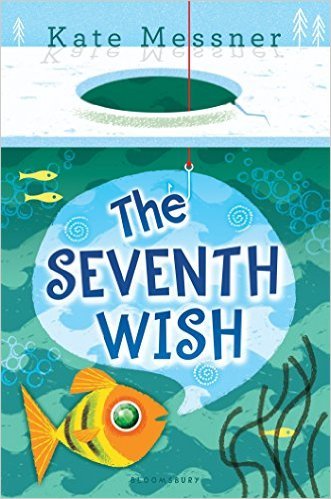
Kate Messner has long been an author of must buy books. Her range and talent mean that she is represented quite well in my classroom library, and the students love her work as much as I do. Kate Messner gets it when it comes to writing books for kids about kids and that kids will want to book talk to others. She writes from the heart, yes, but she also writes from a deep place of wanting to make this world a better place for any kid who may need the book she has created. She writes so that children can find themselves in her books or can learn more about others. And that is the beauty of her latest book; it is a book that will not only allow children to relate, but also for them to learn about a reality that many children face, and often a reality that not many children share out loud.
The moment I heard about the controversy surrounding The Seventh Wish by Kate I was torn up about it. After all, here is a book that handles a topic that often is out of the maturity range for students and yet is so gravely needed in our middle grade classrooms. In fact, I wrote a blog post dedicated to the preservation of hard topic books and why they are so important for our classroom libraries. The Seventh Wish is about figuring yourself out, reconnecting with your family, and yes, it is also about a child dealing with an older sibling’s addiction problem and the effects on the family. The Seventh Wish is a book I wish didn’t have to be written, but it does, and it is so well done. And the thing is, this book is not “just” about opiate addiction and the effects of it on a family. It is about a girl trying to come to terms with what it means to be a middle schooler, who is trying to create the type of life she envisions for herself.
This book can be handled to those who may have experiences with drug addiction, but even more so, it can be handed to those who haven’t. And while it may not be a great fit for some kids, it is for others, and it is for those kids that this book should be a part of a classroom library. So yes, this book is appropriate for the grades it is written for. Yes, this book is needed in our classroom libraries. Yes, this book is not too much, nor too mature for our students. It is a book that will stay with you for a long time, that can lead to discussions, that can lead to a kid perhaps making better choices later in life. I don’t often give books 5 stars, I am rather stingy that way, but this book. This one got 5 stars.
For a much better worded review, please see the Barnes and Nobles Kid Blog.
From Amazon:
Charlie feels like she’s always coming in last. From her Mom’s new job to her sister’s life away at college, everything else always seems to be more important than Charlie’s upcoming dance competition or science project. Unsure of how to get her family’s attention, Charlie comes across the surprise of her life one day while ice-fishing . . . in the form of a floppy, scaly fish offering to grant her a wish in exchange for its freedom. Charlie can’t believe her luck until she realizes that this fish has a funny way of granting wishes, despite her best intentions. But when her family faces a challenge bigger than any they’ve ever experienced, Charlie wonders if some things might be too important to risk on a wish.
Filed under: being a teacher


A Summer of Learning Awaits
I hope that our paths will cross this summer as I get to meet and learn with so many educators.
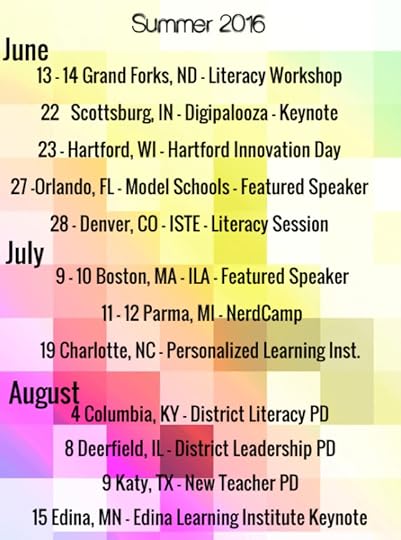
Filed under: being a teacher


June 9, 2016
Our Job is Not to Censor

I have taught children who have never owned a home. Or some who own several. Who have lived solely on the generosity of strangers. I have taught children who have watched their parents get arrested. Children who have watched family members drink until they passed out, shoot up, or take pills. I have taught children whose earliest memories were of a parent walking out on them. Children who have found God, or Allah, or nothing at all. I have taught children who believe that family matters above everything else and some who do not know what family means. I have taught children who from an early age knew they were not straight or the gender they were born with. Every year I teach a new child, whose story breaks my heart and makes me question humanity. We probably all have, whether we know it or not.
We wear so many hats as teachers, as parents. Sometimes we wear many at ones, our roles always fluid, striving to do the very best we can for every child that is in our care. We carry so many words with us that our students entrust us with. Snippets of their life stories as they try to realize who they want to be while they grow up in our classrooms. As they try to accept themselves and the person they see themselves becoming.
This is why one of the biggest responsibilities we have is to offer a safe environment for students to explore their identity, no matter the age of a child. To create an environment where students can relate to each other, even if their lives seem very different. To create an environment where every child can find out that they are good enough, that they are smart enough, that they are not broken. To create a community where all children are accepted, no matter their background, their race, their religion, or any other identifier that may shape their lives.
We can do this through the very books we place in our libraries. Through the very experiences we share as a reading community. Our classroom library spans age groups, it spans ability levels, and it spans topics that may not be suited for all but are certainly suited for some. Because the students I teach deserve to have a library that will allow them to explore topics that matter to them. Because the students I teach deserve to have a library that will allow them to feel found. Because they deserve to have a library that is not based on what I think they need, but rather on a myriad of books that may bring topics into their lives that they need to learn about. That they may already know about but no one else does.
We teach children whose lives we can never imagine. Who may go home to a life that looks nothing like the one we thought they had. We teach children who are curious by nature, whose curiosity may lead them down a path that is destructive unless we somehow find a way to warn them. We teach children who have so many questions about the bigger world but no idea how to answer them. Books help us reach these children. Books that may not work for all children, but may work for some. So when we censor the books we allow into our reading communities we are telling some of our students that the story they live every day is not suitable for the rest of the class. That the life they lead is not meant to be discussed by us. That the experiences they have had is so different/hard/awful/mature that we will not allow a fictional character to experience it along with them, to allow them to feel less alone, less scared, and less broken.
So while we , of course, should read the books in our libraries as there are books better suited for some age groups, we should do everything we can to make sure our library is for all of the children we teach. That our library becomes a way for students to discuss and explore things that they may not be exposed to yet, but that they should know about. That our libraries become opportunities for students to learn about other ideas, beliefs, or lives that may seem foreign from their own. Our job was never to censor, but always to educate. Make sure that your library is for all of the children you teach, and not just those whose story mirrors your own.
PS: Kate Messner, an author I greatly admire, was recently dis-invited from a school visit due to the topic of her newest book The Seventh Wish, a middle grade novel that deals with the effects of drug addiction on a younger sibling. This book should be in our libraries for all of those kids whose reality mirrors that of the main character. To read about what happened and to show your support, please go here.
Filed under: Be the change, being a teacher


June 6, 2016
To My Almost 2nd Grade Daughter
To my almost 2nd grade daughter,
For the past 2 school years, it’s been you and I every morning. I have laid awake for just a few moments in the dark, 5:30 AM, and waited for the courage to wake you up, knowing that mornings do not come easy for you. Together we have danced a delicate morning dance; hot cocoa, even in the warm months, and a guessing game of what to have for breakfast.
Some mornings you have told me stories. Other mornings I have sent you back to your room to find the good mood that seemed to have gotten lost. By 6:25 AM, we have gotten in our car, laden with backpacks and books, and driven toward school together. In kindergarten there was mostly silence. You are not a morning person and so you sat behind me figuring out your world. Once in a while a question would float through the air; why is the sky pink, mom? Why do you talk to your mom every day, mom? Why do I have to go to school, I know everything already, mom? There were days we would argue, other days you would share these stories that could only have come from your imagination and I was awed of your genius.
1st grade started and you seemed to have stretched even more. You didn’t really look like a 1st grader and yet, you were so nervous. Will my teacher like me, mom? Will I have friends? And I drove you quietly every morning trying to let you know that yes, your teacher would like you, and yes, you would have friends. That this would be the year that you would conquer numbers, that this would be the year you would conquer reading. And you believed me.
We would pull into school and you would make a drawing for me and hide it in my classroom. “I love you Mom,” it would say somewhere for me to find. You would leave notes for my students, small surprises. Tell them to have a great day. And every day, my phone alarm would go off and down we would walk to get you on the right bus so you could go to your amazing school and see the teacher that loves you and the friends that you have made. And every day, I told you “Jeg elsker dig” as you got on that bus and drove away from me. Most days you said it right back.
Tomorrow, we drive together for the last time. Daddy’s rationale mind finally convinced me that it didn’t make sense for you to get up so early just to come with me. That there are many great schools where we live and that it would make our days easier. But maybe I don’t want easy. Maybe I am not so sure that I want to drive alone every day. Maybe my mind tells me that it all makes sense but my heart breaks just a little. Because every day it was you and me watching the world. Hours of listening to Harry Potter – we will finish book 5 tomorrow – and weaving the threads of our lives together. That time we had was just for us and now, after tomorrow, I will have to wait just like the rest of the world until I get home to hear about your day.
So Thea, I will miss you. I will miss our early mornings trying to tiptoe around so as not to wake up your siblings. I will miss your demands for more marshmallows. For only a tight ponytail and leggings. Your indecisiveness when it comes to food. Our hurried rush out the door and the quiet that followed. How you would yell at me if I don’t turn on the book right away. How you would pass me a blanket when you knew I was cold. Your made up songs and your one final hug before the bus came.
Every day as a parent, it seems like we say goodbye to bits our children for when they return they come back a little bit different. A little bit older. A little bit more independent. As it should be. But it is hard to let go, change, to see our venture forth into a new world. One that doesn’t involve me and you and our kitchen and our car and our goodbyes every morning at the front of my school.
And yet, you told me tonight that you are so ready for 2nd grade. You cannot wait to go to your new school. To meet new people. To try new things and to read chapter books. You started to walk away and then you said, “…but on that first day, I would really like if you could just drive me and then walk me in. That would be great, Mom.”
That would be great, Thea. That would be great…
Love,
Mor

Filed under: being a teacher, being me


June 5, 2016
The 25 Book Challenge
33% of my 118 7th graders told me they had not read a single book last summer. That books were just not their thing or they were simply too busy. 33%…Many of them told me they had read the book club books they had been assigned the year before but not that much else. Some told me they had fake read most of their way through years prior, averaging 1 to 2 books a year if even. Some told me how much they loved books, that their summers were spent with their nose in pages because what else would you do when you have all of the time in the world
Teaching 7th graders has taught me many things, but one of the biggest is the incredible need to inspire a larger love of reading in more of their lives. Not because teachers before them haven’t, but because for some reason it hasn’t completely stuck for all of them. So that becomes our mission; for the students to fall in love with reading or at the very least hate it less.
One of the biggest expectations in our classroom is to read 25 books (or more if that is not a high enough goal). Inspired by the 40 book challenge created by Donalyn Miller and described in the incredible book The Book Whisperer, I knew that when I moved to 7th grade I wanted to do something similar but adapted to the crazy life of middle schoolers and only having 45 minutes of English every day. I knew I could only give them 10 minutes of reading every day and so I needed a number that would push most students, set a high expectation, but also be a tangible goal. It therefore became 25, with a few guidelines:
Books under 200 pages count as 1 book
Books over 200 pages count as 2 books
Books over 500 pages count as 3 books
Books more than 750 – see the teacher
Depending on its size a graphic novel may count as a whole, half or quarter of a book.
10 of the books have to be chapter books
If this goal is not high enough for a learner, they set a higher goal
They write down their titles in a packet we keep at school and update it every Monday or whenever needed.
I do not ask them to read certain genres but instead take this as an opportunity for them to explore themselves as readers and figure out what they love to read. I constantly book talk books, as do they once we get rolling, and I am constantly sharing recommendations to individual students. We practice wild book abandonment, making sure that the books we read are books we actually want to read, and we book shop monthly if not more. Our to-be-read lists are extensions of our reading life and are used weekly, if not daily.
I introduce the challenge on the second day of school and some kids are scared (as are some parents), they do not feel they can ever reach that high of a number. What they do not know is the magic behind the challenge; there is no punishment if they don’t reach 25, but the challenge is meant to inspire them to read more than they did they year before. To stretch themselves as readers, to find great books, to have great reading experiences and add a new label to their identity; reader.
After 2 years with the 25 book challenge, I can tell you, it works. I am not surprised, after all, Donalyn Miller and her ideas have never let me down. While not all kids reached 25, many did, and many of those who did, never thought they would. Yet the biggest success is not just the kids that reach their goal but within the kids that don’t. As one child told me on his reading survey, “…I even read a book at home for fun, I had never done that before.” That child’s number? 5 more than the year before. 5 more great books that he loved so much he book talked them to others. Books that gave him such a great experience that he continues to chase that feeling again.
I will not pretend that it worked for everyone, there are always kids that it does not work for, where what we did together was not enough, but there are so many that it made a difference for. Where the expectation to read every single day and reach a certain goal meant that they turned up their reading, that they selected their books more carefully, that they spent a longer stretch reading then they normally would have.
So for the 118 7th graders that I teach, I am so grateful that they believed me when I told then, “Yes, you can read 25 books.” But do not take my word for it; let these pictures show you what it looks like when 7th graders read and become readers. Let these pictures show you that yes we can get kids at this age to read, that just because a child is going through huge personal development reading is not lost. What matters is the reading community we create. 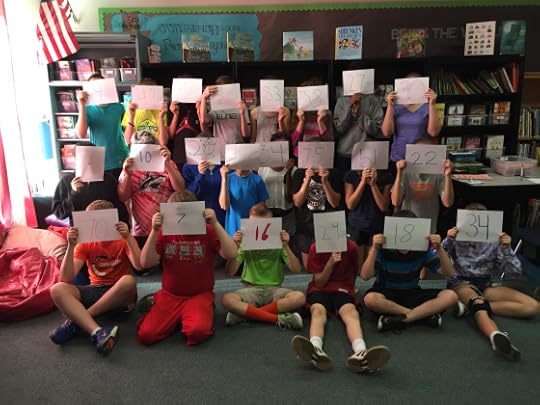
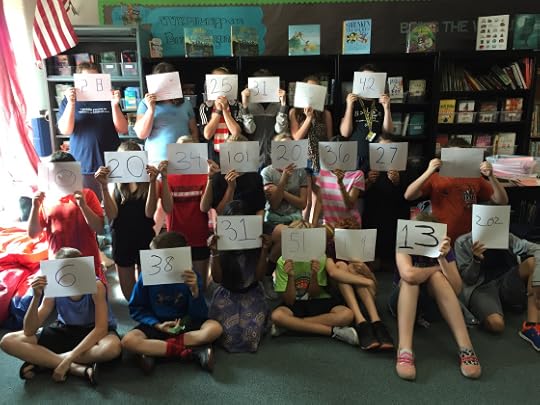
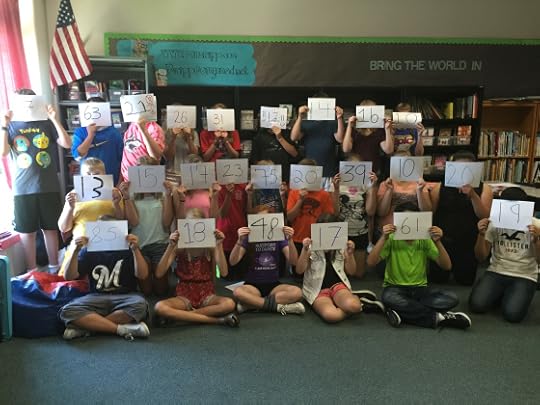
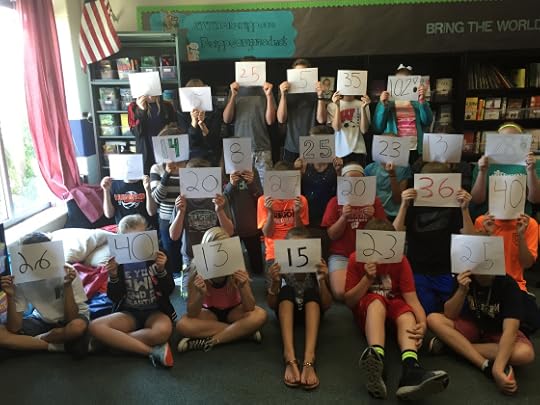
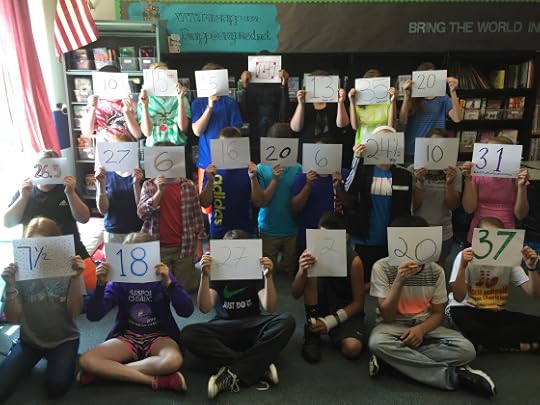
And in case you are wondering, that is 4,357.5 books. Not bad for how many kids told me that reading was not something they felt like doing.
If you are wondering why there seems to be a common thread to so many of my posts as of late, it is because I am working on two separate literacy books. While the task is daunting and intimidating, it is incredible to once again get to share the phenomenal words of my students as they push me to be a better teacher. The first book tentatively titled The Global Literacy Classroom is scheduled for release November, 2016 by Solution Tree. The second, which I am still writing, is tentatively Passionate Readers and will be published in the summer of 2017 by Routledge. So until then if you like what you read here, consider reading my book Passionate Learners – How to Engage and Empower Your Students. Also, if you are wondering where I will be in the coming year or would like to have me speak, please see this page.
Filed under: being a student, being a teacher, challenge, Literacy, Reading, Reading Identity


June 4, 2016
A Parent’s Role in Protecting the Love of Reading
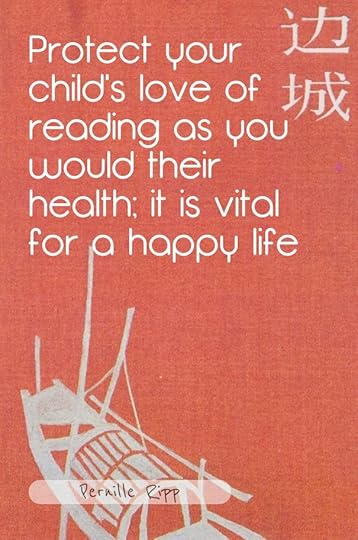
I have not hidden the fact that my oldest daughter has been a developing reader for the past 2 years. That something that came so easy for me, has been a fight for her, where the words stammered and stuttered and her frustration grew. But. We just received word from her teacher that she is at grade level as she finishes 1st grade. That all of her (and their) hard work has paid off. That it now is up to us to keep her reading to keep building on the momentum she is on.
Thea is lucky. She has been in a school where they value creating reading experiences above everything else. Where they work with each child at their level and try to keep reading magical. Where each child is given time to read self-chosen books, receive one-to-one or small group instruction, and the emphasis is on reading for fun, not reading for requirement or prizes. As a school, they have said no to so many things we know can harm the love of reading.
Our role as parents has been to uphold the expectations they have created; reading for fun, reading as a natural part of our day, reading as something that becomes part of the conversations we have every day. We have gladly embraced it. We have not had to protect our daughter’s burgeoning love of reading from some of the practices such as reading logs, reading for rewards, AR, or forced daily reading reflections we see around schools, but what if we did? What can we do then?
We can ask questions. I think of all of the well-meaning things I did my first years as a teacher that I thought would help children read more that I now cringe at; reading logs, rewards, book reports and projects, reading reflections every night and so on. No parent ever asked questions because they assumed I knew what I was doing, but the truth is, I was still developing and learning. I did these things because I thought that is what good teachers did. Whenever parents ask questions, it may at first be off-putting, but in the end it always helps me grow. It always offers me a chance for genuine reflection, a chance to re-visit the components that I teach. This is never a bad thing even if it feels that way at first.
We can share the research. These ideas of protecting a love of reading are not just based on momentary whims. Research has shown time and time again how for example external factors such as points, scores, or even food negatively impact a child’s desire to read. (For a great article on reading logs see this). If a school has misguided practices in place, then perhaps they have not seen what is out there that can help them grow? There are nice ways to present research that doesn’t involve chastising other people, especially since it is not always the choice of a teacher to do some of these things, but instead that of a well-meaning district. So share research and don’t be disappointed if it makes no difference, sometimes even the best research only plants a seed that we will not see come to fruition for a long time.
We can lie. I know that sounds terrible, but as far as Thea’s kindergarten reading log, I decided to sign it every night and not show her. She didn’t need to know that she was working toward anything, nor did she need to know that I had to keep track. So I didn’t tell her and I didn’t keep track, instead I rummaged through her backpack every night and simply signed so her teacher could in turn sign off every morning. Thea was a reader but even readers take a night off her and there.
We can say no. No one wants to be THAT parent but sometimes we have to be. Saying no to a school-wide practice such as reading logs or the use of AR can be a daunting task, but we have to remember the bigger picture; protecting a child’s love of reading. In Thea’s first kindergarten class, she was presented with a reading log on the 2nd day of school, all in order to be included in a pizza party. When I asked questions about it, I was told that in later years the reading log would be a part of her grade for reading and that if she didn’t do it, her reading grade would suffer. Her grade! While, at first, this startled me I soon realized that I was fine with that. So be it if her grade was lower because she didn’t participate. Her grade didn’t matter as long as she found reading enjoyable and not something you did to earn something. Sometimes change will not come until parents speak up, so be the voice of reason and if you see something changing your child’s reading habits for the worse, then do something about it. Don’t just expect it to be ok in the end. Protect your child’s love of reading as you would their health; it is vital for a happy life.
We can create our own enjoyable reading experiences. Sometimes we have to be the counterpoint to the environment our children are in. If we know that self-selected books are a major component to creating pleasurable reading experiences then that is what we should strive for. While the parent in me often felt panicked that Thea was not making the necessary gains as a reader, the teacher in me knew that it simply would take time. That forcing her to read more books every night, or even write more about her reading, would only make the experience miserable for her. So keeping reading fun, making it a family event (see this blog post for lots of summer reading experience ideas) and making it a natural part of your day are all choices we can make, whether or not our child’s school believes in it.
We have been so lucky as we look back on Thea’s short reading life. As she switches school this coming school year, I can only hope that it will continue. We may sometimes wonder about the policies that directly influence our children, but we should never feel powerless. As parents, we have a right and a responsibility to protect our child, we must ever forget that.
If you are wondering why there seems to be a common thread to so many of my posts as of late, it is because I am working on two separate literacy books. While the task is daunting and intimidating, it is incredible to once again get to share the phenomenal words of my students as they push me to be a better teacher. Those books will be published in 2017 hopefully, so until then if you like what you read here, consider reading my book Passionate Learners – How to Engage and Empower Your Students. Also, if you are wondering where I will be in the coming year or would like to have me speak, please see this page.
Filed under: being a teacher, Literacy, parents, Reading, Reading Identity


June 2, 2016
The One Thing that Made the Biggest Difference (According to My Students)

I asked my students what made the biggest difference. I asked them what I should tell other educators as I ready myself for speaking this summer, honored to be invited to so many great states. I asked them what they wished every teacher would do, if they had to pick one thing, what would it be? Answer after answer, paper upon paper, they told me their one thing. And while I wasn’t surprised, I had not expected it to be so frequent. I had not expected it to show up on so many independently answered surveys. I had not expected it to be the ONE thing so many times.
Please tell them to give us time to read. Please allow us at least 10 minutes. Please tell us to read. Tell us to read only great books. Give us the time so we can fall back in love.
The time; that was the most important.
I have started almost every single day with a sacred 10 minutes of reading. Not enough, I know, but when I only get 45 minutes to teach English, it is more than 1/5 of our time. Every day I have expected all students to read and to read a good book. Every day I have expected students to fall into the pages that they chose and only come back up when the timer sounds and the rest of our class begins. I was scared of what we would lose in our curriculum by giving them so many minutes. I was scared that I would not be enough of a teacher by telling them that for those 10 minutes I would only interrupt a few of them every day, but mostly they would be left to read. I have read the research, of course, that speaks of the power of 10 minutes. As a teacher I believe in it, but to have it come straight from the very students it effects? That is powerful. That is something worth sharing.
When we hope for a reading miracle, when we hope for the one thing that will make a child a reader, it seems like this is it. That independent reading of self-chosen books is truly what will help all of our readers, whether dormant, resistant, or already in love, develop into readers who will leave our classrooms knowing that books have a place in their life.
So as we teach the older students, those students that might not have the luxury of longer literacy blocks. Who may not have the luxury of reading work shop. Who may not have the luxury of choice. I implore you to please take my students’ advice to heart; give them time to read, even if only for 10 minutes. Give them time to read a book they choose. Make it the expectation and not just once in a while, but every single day. I promise it will make the biggest difference. At least it will, according to my students.
If you are wondering why there seems to be a common thread to so many of my posts as of late, it is because I am working on two separate literacy books. While the task is daunting and intimidating, it is incredible to once again get to share the phenomenal words of my students as they push me to be a better teacher. Those books will be published in 2017 hopefully, so until then if you like what you read here, consider reading my book Passionate Learners – How to Engage and Empower Your Students. Also, if you are wondering where I will be in the coming year or would like to have me speak, please see this page.
Filed under: being a teacher, Literacy, Reading, student choice, Student dreams, student voice


May 31, 2016
Take the Time
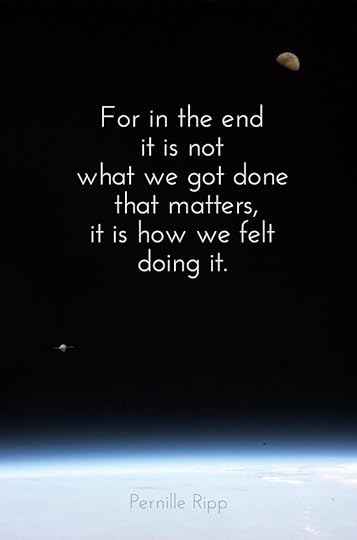
There seems to be no greater rush in school then these last few precious days before we say goodbye, before our time is up. I look at my own to-do list and wonder just how much will actually get to done. The pressure of it all nips at my heels as I wonder whether my students could possibly speak a little bit faster as they deliver their end of year speeches. Will we get through them all? We have so much to do still.
Yet, as I listened today to a boy share his message of hope and forgiveness. To another who shared the value of friendship. To one who decided to challenge our racial beliefs, and one that made me cry (actually two did) because they stood up there and spoke their truth, I knew what I had forgotten. To take the time.
To take the time to say goodbye the proper way.
To take the time to laugh.
To share memories and stories. To take the time and not feel guilty all of the time for all of the things we didn’t get to do.
Take the time to remember all of the great and all of the not so great.
Take the time to remember the very best books, projects, or whatever else you may have shared.
To take the time to ask just a few more questions so that you can grow over the summer.
To take the time to thank you students for the journey you have been on.
May we never forget to be grateful for the things we take for granted, for the community we create, for the memories we make.
May we never take for granted that our year, while tough at times, was still a success and that all of those students did actually grow, even if it was not as much as we had hoped.
May we never forget that for a brief moment in time we were a part of the future by being a part of a child’s life.
So take the time to say goodbye and don’t worry so much about the to do. Because in the end it is not what we got done that matters, it is how we felt doing it. SO take the time to take the time and don’t let your guilt consume you.
If you like what you read here, consider reading my book Passionate Learners – How to Engage and Empower Your Students. Also, if you are wondering where I will be in the coming year or would like to have me speak, please see this page.
Filed under: being a teacher, being me, building community, end of year


May 30, 2016
Warning: This Will Get Stuck in Your Head
I first fell in love with the music (and videos) of Emily Arrow when Mr. Schu ran a contest for the picture book Louise Loves Art. Be one of the first 5 classes to tweet out a picture of kids singing along and win a copy of the book. I had heard of Emily Arrow before but for some reason had never clicked on her videos. I wasn’t sure how my students would react, after all, they are sometimes way too cool to get a little silly, but that day I realized what a genius Emily Arrow and her music is. As I played her infectious tune and watched my 7th graders, yes 12 and 13 year olds, dance and sign along, I knew that I had to share Emily Arrow and her talent with as many people as possible.
Emily Arrow is the real deal; her love of picture books flows through her songs, which entice us to read the books just one more time. My own children are hooked as well and even my husband who has a notoriously picky style of music will play the songs and smile broadly. You simply cannot help but sing along as the music starts to play. Yet the genius of Emily Arrow is not just her songs, it is the videos she creates to go along with them. This is why my students have acted out jazz hands and drawn in the air. And this is why my students asked if they could please send her some questions, so we did, and she answered them! Thank you Emily Arrow; we are so thankful you are sharing your genius with the world.
1. What is your favorite song to sing?
I love to sing the Louise Loves Art Song (inspired by the book by Kelly Light) because I love when the audience echoes the lyrics in the chorus. Check out the video too!
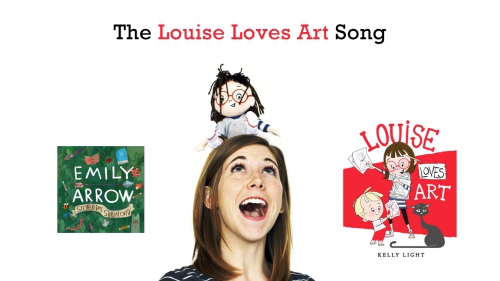
2. What inspired you to do this type of music?
I decided to create kidlit tunes (songs inspired by books!) because I was a music teacher for students in Kindergarten through sixth grade for three years!
3. How do you come up with the ideas for the videos?
I try to think of a way to use the colors, ideas, and feelings from the song and/or book in the video. Then I think of two or three places to record parts of the video that have something to do with the song. The brainstorming is soooo much fun for me!
4. What has been your favorite video to make?
I loved making the NO, NO, GNOME video because I got to hang out with my pal Ashlyn Anstee all day.
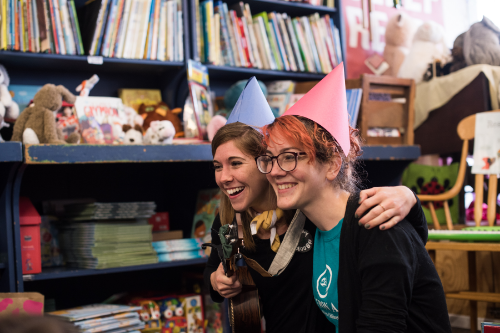
5. How do authors and illustrators react to your songs?
One time, one sent me an illustration in the mail as a gift. One time, one cried! It’s always different but I always want them to feel appreciated for the work they do creating their amazing stories.
6. What are some songs you are working on?
I’m working on a fun song about a wizard, one about a kid who’s a cactus, and another that’s about friendship called Zoomba Zoo as a collaboration with illustrator Zoey Abbott Wagner!
7. How do you keep your imagination on the outside?
Love this Louise-y question! Writing songs is an awesome way to share what’s on my mind in the world. And I write LOTS of lists in medium-sized notebooks. I use about a notebook a month full of thoughts and ideas and to-dos!
So do yourself a favor; go check out Emily Arrow’s music on her website, order her cd, buy the books, and of course, watch the videos. I promise you won’t regret it…jazz hands!
Filed under: being a teacher, Reading





